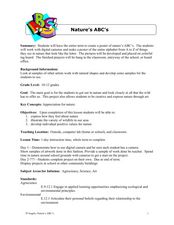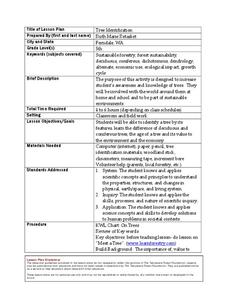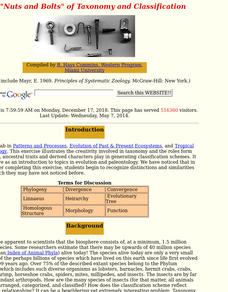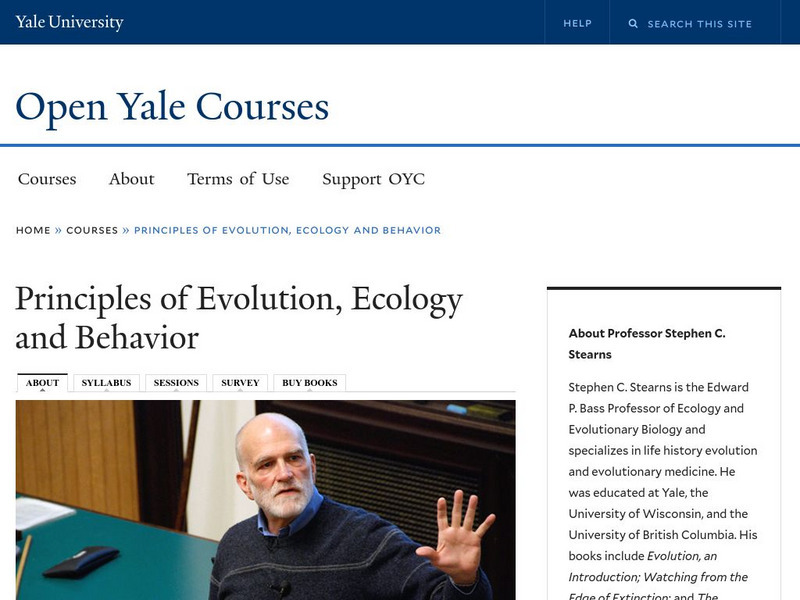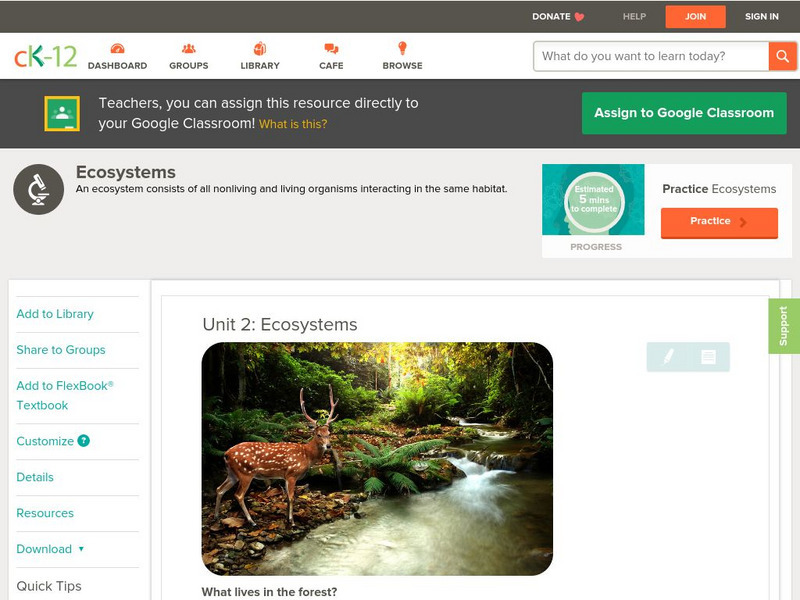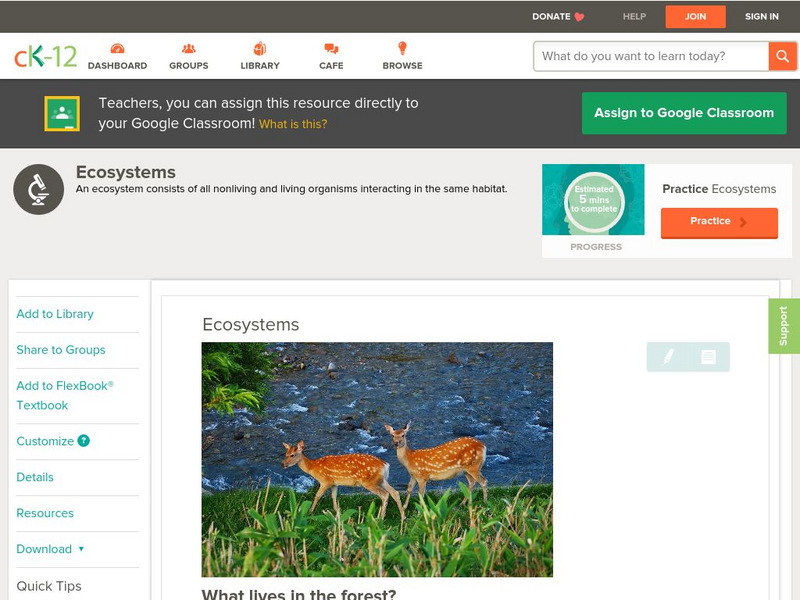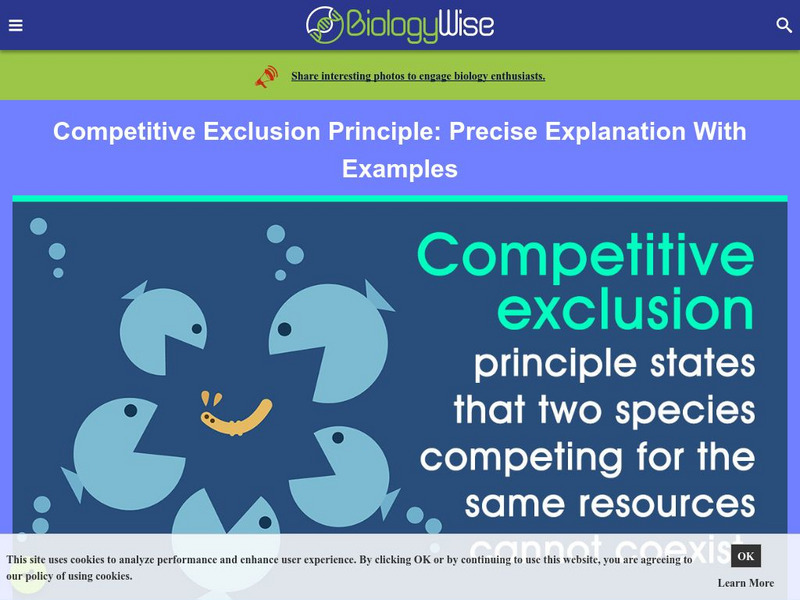Curated OER
Contaminated Drinking Water
Students discover whether their senses can detect unsafe drinking water. In the water activity lesson, students follow procedures to determine whether their bodies can detect contaminated water.
Curated OER
What Makes you Hot?
High schoolers manipulate different variables in a model and make inferences about the temperature on Earth. In this heat lesson students calculate the blackbody radiation of an object at a certain temperature.
Curated OER
Nature's ABC's
Students will recognize objects in nature that are similar in shape to the letters of the alphabet. For this digital camera lesson, students will find objects in nature that look like letters of the alphabet. They will create a poster of...
Curated OER
Tree Identification
Students list four ways to identify trees. For this tree identification instructional activity, students use tree identification techniques such as leafs, bark, wood grain, soil type, and climate to create tables and graphs.
Curated OER
A Living Watershed
Pupils, through this series of lessons, use local resources, speakers, print and video materials, as well as standard text materials to study the ecosystem of the local watershed.
Curated OER
Biological Control of Purple Loosestrife
High schoolers examine the role of Purple Loosestrife in Illinois and Indiana rivers. In groups, they collect a wide variety of plants in a wetland and raise beetles in a controlled environment. They introduce the loosestrife into the...
Curated OER
The "Nuts and Bolts" of Taxonomy and Classification
Learners develop classification scheme that meets the established rules of the Linnaean system. They write one page essay on classification choices.
Curated OER
About Abraham Lincoln
Fifth graders complete a variety of activities and exercises as they study the life, policies, and lasting influence of Abraham Lincoln.
Curated OER
You've Got to See It to Believe It!
Fifth graders examine smog and particulate matter as two major visible air pollutants. They discover how the pollutants formed and how engineers work on visible air pollution. They design an advertisement for a hybrid vehicle.
Curated OER
Explore the Food Web
Students identify plants and animals in the journals of Lewis and Clark's expedition. They describe the various animal habits. Students interpret the behaviors of the animals discovered on the expedition. They design a food web using...
Curated OER
"Approaching Walden: From Emerson to Thoreau"
Students examine selected local leaves in greater detail in the classroom by using more analytical drawing techniques. They use Thoreau's drawing of a Scarlett Oak as their model. Students choose a leave from a box of leaves removed...
Curated OER
Birds of Different Feathers: Species Specialization
Students identify differences in bird species and explain the concept of species specialization. They attain the knowledge that different birds occupy different habitats.
Students identify characteristics and features of birds that make...
Other
Minnesota Dnr: Ecological Principles & Land Cover Characteristics
Lists the six attributes used to identify terrestrial and wetlands areas that are important ecologically. These attributes are based on four ecological principles, which are explained.
Yale University
Open Yale Courses: Principles of Evolution, Ecology, and Behavior
Access any one of thirty-six lectures from a biological sciences course, in audio, video, and text format. Coverage includes evolution, natural selection, the fossil record, the history of life on Earth, ecological communities,...
Morning Earth
Morning Earth: Thirty One Learning Activities Toward Ecological Literacy
This informative lesson plan site explains how to use art in the classroom to teach science. Thirty-one plans are provided on various ecological topics. As the art is made the students are implicitly learning the ecology principle.
McGraw Hill
Glencoe Biology: Principles of Ecology: Chapter Test Practice
A set of fifteen comprehension questions which test over various ecological concepts.
CK-12 Foundation
Ck 12: Episd: Ecosystems
[Free Registration/Login may be required to access all resource tools.] Explore ecosystems and ecology on an introductory level uncovering fact about types of ecosystems and the competitive exclusion principle.
Cosmo Learning
Cosmo Learning: Principles of Evolution, Ecology and Behavior
A collection of video lectures introducing beginning biology students to the principles of evolution, ecology, and behavior. The course was taught three times a week for a semester at Yale University. The course discusses concepts of...
CK-12 Foundation
Ck 12: Biology: Ecosystems
[Free Registration/Login may be required to access all resource tools.] Introduction to ecosystems and other ecological concepts.
CK-12 Foundation
Ck 12: Biology: Ecosystems
[Free Registration/Login may be required to access all resource tools.] Introduction to ecosystems and other ecological concepts.
Sea World Parks & Entertainment
Sea World: Biodiversity
Depicts biodiversity with a brief narrative. Includes vocabulary, bibliography, and one activity. Subject matter at an upper intermediate grade level or higher.
Other
Branksome Hall Asia: Design and Inquiry: Sustainable Design
Sustainable design is a philosophy of developing products in line with social, economic, and ecological sustainability principles. In design, it is important to understand the distinction between Green Design and Sustainable Design....
BiologyWise
Biology Wise: Competitive Exclusion Principle
The concept of competitive exclusion, explained here, states that two species cannot co-exist when needing the same, limited resources to survive. The different types are described and examples are provided.
CK-12 Foundation
Ck 12: Life Science: Competition
[Free Registration/Login may be required to access all resource tools.] Ecology is the study of how living organisms interact with each other and with their environment. Organisms interact with each other through various mechanisms, one...
Other popular searches
- Ecology Principles Biotic
- Ecology Principles Abiotic
- Ecology Principles Quadrants
- Principles of Ecology




